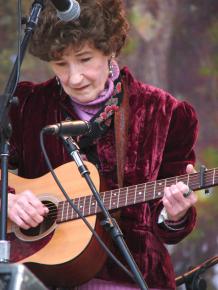A fire in her heart
looks back on the life of bluegrass musician Hazel Dickens.
THE FIRST note of the first word I ever heard Hazel Dickens sing changed everything I understood about the convergence of music and politics.
It wasn't just her delivery, tone and cadence that separated her from other bluegrass singers. Her voice had a power behind it that could make every coal company owner, sexist or crony politician cower in a corner.
Hazel Dickens' musical career spanned six decades, producing four solo records, six records with Alice Gerrard, as well as parts in the films Harlan County USA, Matewan and Songcatcher. She died on April 22 at the age of 75.
With Hazel Dickens on standup bass and Alice Gerrard on guitar, the two began collaborating, writing music, recording and touring in 1965. In an era when most bluegrass bandleaders were men, Dickens and Gerrard kicked the doors in and paved the way for artists like Alison Krauss and others today.
Dickens and Gerrard penned songs, such as "Don't Put Her Down, You Helped Put Her There," defining the peaks of the women's liberation movement of the 1970s. In a 1999 interview with No Depression magazine, Dickens described writing about sexism and women's oppression. "We were writing about our own experience," she explained. "They were things we needed to say."

Hazel Dickens was one of 11 children who grew up in a three-room shack in a coal-mining town in Mercer County, W. Va. Coal mining is an industry that destroys lives in every conceivable way. Whether it's the maddening pace of the work, the imminent danger coal miners face or the emotional toll of watching loved ones die of lung disease, the sheer brutality of coal mining scars generations who have very few options to make a living in rural areas of the U.S.
The harrowing nature of coal mining can be heard in every song that Hazel Dickens sang but the raw emotion of the song "Black Lung" is one that is to be experienced, not just listened to.
He went to the bossman but he closed the door.
Oh, it seems you're not wanted when you're sick and you're poor.
You're not even covered in their medical plan
And your life depends on the favors of man.
Written for her brother nearly 40 years ago, the words still sting with truth, but it is the sound of Dickens' voice that takes the listener to the front lines of a mine occupation or the chilling call to action from a packed meeting hall. On "Black Lung," all of this is done with only her voice in the "front porch" tradition.
Dickens' defiant firebrand to those who would stand in the way of workers' and women's rights defined her brand of the high lonesome sound. In the song "Fire in the Hole," you can hear her voice fill the entire room and feel the immediacy on the opening lines:
Stand up boys, let the bosses know
Turn your buckets over, turn your lanterns low
There's fire in our hearts and fire in our soul
but there ain't gonna be no fire in the hole.
You would be hard pressed to hear lyrics that poignant on the corporate FM dial, which ignores the struggles of today. But it was her voice that made those words come to life and send chills down the spine of anyone with a pulse.
Dickens leaves behind a brilliant musical legacy that politically points the way forward for musicians today.


